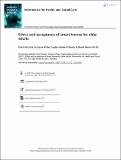Files in this item
Ethics and acceptance of smart homes for older adults
Item metadata
| dc.contributor.author | Pirzada, Pireh | |
| dc.contributor.author | Wilde, Adriana | |
| dc.contributor.author | Doherty, Gayle Helane | |
| dc.contributor.author | Harris-Birtill, David | |
| dc.date.accessioned | 2021-07-14T11:30:01Z | |
| dc.date.available | 2021-07-14T11:30:01Z | |
| dc.date.issued | 2022 | |
| dc.identifier | 273992691 | |
| dc.identifier | d4a46895-07c8-4296-ac5a-c8a802326871 | |
| dc.identifier | 000671466200001 | |
| dc.identifier | 85110362930 | |
| dc.identifier.citation | Pirzada , P , Wilde , A , Doherty , G H & Harris-Birtill , D 2022 , ' Ethics and acceptance of smart homes for older adults ' , Informatics for Health and Social Care , vol. 47 , no. 1 , pp. 10-37 . https://doi.org/10.1080/17538157.2021.1923500 | en |
| dc.identifier.issn | 1753-8157 | |
| dc.identifier.uri | https://hdl.handle.net/10023/23548 | |
| dc.description | Funding: The research is funded by School of Computer Science, University of St Andrews and St Leonard College for Pireh Pirzada's PhD thesis. | en |
| dc.description.abstract | Societal challenges associated with caring for the physical and mental health of older adults worldwide have grown at an unprecedented pace, increasing demand for health-care services and technologies Despite the development of several assistive systems tailored to older adults, the rate of adoption of health technologies is low. This review discusses the ethical and acceptability challenges resulting in low adoption of health technologies specifically focused on smart homes for older adults. The findings have been structured in two categories: Ethical Considerations (Privacy, Social Support, and Autonomy) and Technology Aspects (User Context, Usability, and Training). The findings conclude that older adults community is more likely to adopt assistive systems when four key criteria are met. The technology should: be personalized toward their needs, protect their dignity and independence, provide user control, and not be isolating. Finally, we recommend researchers and developers working on assistive systems to: (1) provide interfaces via smart devices to control and configure the monitoring system with feedback for the user, (2) include various sensors/devices to architect a smart home solution in a way that is easy to integrate in daily life, and (3) define policies about data ownership. | |
| dc.format.extent | 28 | |
| dc.format.extent | 1347811 | |
| dc.language.iso | eng | |
| dc.relation.ispartof | Informatics for Health and Social Care | en |
| dc.subject | Ethics | en |
| dc.subject | Smart home | en |
| dc.subject | Ambient-assisted living | en |
| dc.subject | Assistive technology | en |
| dc.subject | Ethical aspects | en |
| dc.subject | BJ Ethics | en |
| dc.subject | QA75 Electronic computers. Computer science | en |
| dc.subject | RA0421 Public health. Hygiene. Preventive Medicine | en |
| dc.subject | SDG 3 - Good Health and Well-being | en |
| dc.subject.lcc | BJ | en |
| dc.subject.lcc | QA75 | en |
| dc.subject.lcc | RA0421 | en |
| dc.title | Ethics and acceptance of smart homes for older adults | en |
| dc.type | Journal item | en |
| dc.contributor.institution | University of St Andrews. School of Computer Science | en |
| dc.contributor.institution | University of St Andrews. Centre for Biophotonics | en |
| dc.contributor.institution | University of St Andrews. School of Psychology and Neuroscience | en |
| dc.identifier.doi | https://doi.org/10.1080/17538157.2021.1923500 | |
| dc.description.status | Peer reviewed | en |
This item appears in the following Collection(s)
Items in the St Andrews Research Repository are protected by copyright, with all rights reserved, unless otherwise indicated.

